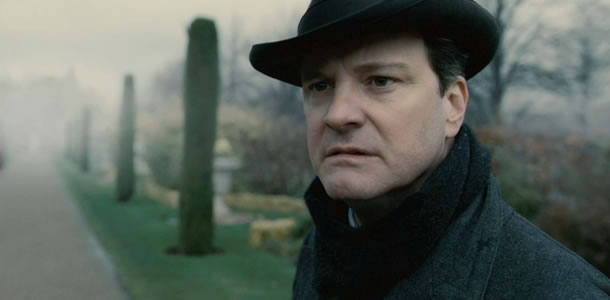
Movie Review: The King’s Speech
In preparing for the Toronto International Film Festival and reading some of the press coverage that came out of the Telluride Film Festival, I noticed praise for The Kings Speech by Tom Hooper, starring Colin Firth as the Duke of York (second in line to the throne of England in the 1930s) and Geoffrey Rush as the speech therapist without any real credentials who helps the troubled royal overcome the stutter which prevents him from speaking in public.
At the risk of telling you too much, the stutter is defeated in the most unorthodox way. Hitler is eventually defeated, too. And yes, British royals are people, too – they just have bigger houses and a lot more servants than we do. Its a lesson that we learned in The Young Victoria, The Queen, and in The Madness of King George. (If you see The American, with George Clooney, youll learn that lonely assassins are people, too. They just have better guns and longer closeups.)
The real lesson here seems to be that North Americans (Canada as much as the US) will eat up anything about the British royal family – the more sugar, the better. Facts dont need to get in the way. Nor does the fact that The Kings Speech is trivial piffle, about as appealing as British food was back then.

Colin Firth and Helena Bonham Carter in "The King's Speech"
The Kings Speech begins in the 1930s, when the Duke of York (Firth) is afflicted with a terrible stutter. His disability is laid bare to the world when he tries to read a letter from his father, King George V, on the occasion of the closing of a grand exposition at Wembley Stadium. Note the perfect Oprah moment. Its bad enough to have a stutter, but its heartbreaking when you let everyone know. (Never mind that millions of British are at the edge of starvation in the Great Depression, or that Britains monarchy is living off the exploitation of regions all over the world.)
On the advice of his wife (Helena Bonham Carter, who plays the future Queen, and future Queen Mother, wearing outrageous hats that point to her post-war destiny), Bertie, as the Dukes family calls him, looks for a cure. When all else fails, the Duchess seeks out Dr. Lionel Logue (Rush), a specialist who seems to have a good track record. Its a last resort.
The two begin an odd journey, through painful conversations about the Dukes emotionally stifling upbringing and exercises like singing and yelling profanity. The royal loosens up, which is what we ordinary folks (especially Americans) want to see. I wont give it all away, but the drama of speech pathology is set against another drama: the death of King George V in 1936, and the notorious love affair between the Dukes silly weak brother, King Edward VIII (played by Guy Pearce) and his American mistress, Wallis Simpson.
Who remembers the huge scandal when that King (officially the head of the Church of England) abandoned all decorum for the love of an American “divorcee” and eventually gave up the throne to become the Duke of Windsor? Who remembers that his brother, the eventual King George VI, had a stutter? Who cares? You will now. Youll also learn that the King was steadfast in his lifelong devotion to his speech therapist, even overruling the advice of the Archbishop of Canterbury to fire him. The King leads his country into war — if you call reading a few sentences leadership — and you sort of know all the rest.
The Kings Speech has a lush look when pageantry is required, and a darker intimate feel when Bertie and Lionel are working in Lionels spare office. Much of it plays like a work of theater. Or like a television play about a minor detail in the life of an over-privileged ruler that someone has stretched into a feature film.
Some critics are calling for Oscar nominations for Colin Firth. Not for the script, I hope. Lets not kid ourselves. England was not saved from Hitler because a monarch learned to read a page on the BBC without stammering. We had Winston Churchills rousing oratory (and lots of American help) for that, and Timothy Spall injects some unintentional humor as a scowling Churchill who never gives a speech in this piece of fluff. Its the difference between the Olympics and the Special Olympics.
The Oprah-ready tale could not be more trivial. It should make lots of money.
